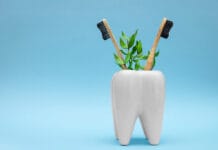I can still remember how it felt in those first few months out of hygiene school. The anxiety over finding a job, the thrill of landing one, and the excitement of finally being able to practice Dental Hygiene as a clinician in private practice. It was all so new and exhilarating, like setting off on an adventure into my future! Fast forward seven years, the future is not quite as exhilarating as I thought it would be.
Maybe it’s like the so-called seven-year itch in a marriage. Maybe careers can have itches too. Don’t get me wrong; I still work for the same amazing office that I started in. I am lucky enough to have a supportive and nurturing professional environment to practice in and could not ask for more, so what gives?
Dental Hygiene, as you all know, can get a little repetitive and I was starting to notice it. For those of you who have seen the movie Groundhog Day, you know what I mean. Sometimes I felt like Bill Murray waking up on the same day, over and over again, with no end in sight. Patients would come and go, and inside I was thinking, “same spit different day.” Even the patients were on repeat, literally!
I did not want to become one of those burned out hygienists working on autopilot for the next twenty years. So, I started to think about how I could overcome this déjà vu’ syndrome that seems to plague so many in our profession. Then it hit me, mindfulness! Mindfulness was something I had heard a lot about lately, and I decided to start looking into it a little deeper. The dictionary definition of Mindfulness is the practice of maintaining a nonjudgmental state of complete awareness of one’s thoughts, emotions, or experiences on a moment-to-moment basis; also a state of awareness.1
Mindfulness has gained popularity in recent years in conjunction with other Eastern practices such as yoga and meditation. It originates from Buddhist and Hindu practices and involves awareness of one’s self and experiences.2 The practice of mindfulness becomes easier the longer it is implemented, and in addition to improving happiness, it is also used to relieve anxiety and depression symptoms.3
I started to realize that the practice of mindfulness could be applied to the Dental Hygiene profession and all professions, for that matter. By focusing on how I was feeling about my career and really focusing on the day to day feelings about my job I could start to understand how I could make things feel exciting again!
I know this may sound like a lot of new age mumbo jumbo to some, including me at one point, but given the chance, mindfulness techniques can be used to put the passion back into your job. It’s basically just a change of mindset and focus. Many people, especially in particularly repetitive jobs, tend to zone out eventually. Your mind simply becomes bored with what you’re doing and no longer focused. This is what was happening to me. I was no longer feeling challenged and inspired by my job. After reading about mindfulness, I realized that the answer to reigniting the passion for my career might just be a change in my way of thinking.
I have not been in the dental hygiene field for as long as many of you, but I have been around long enough to know that these feelings are very common in the profession. Many hygienists feel bored, trapped, and uninspired. It’s easy to simply go through the motions and let years slip by without ever acknowledging these feelings, but it doesn’t have to be that way! We owe it to ourselves and our patients to be fully present, engaged, and happy in our careers.
As soon as I was actively focused on how I was feeling about my job, and responding to those feelings, things immediately started to turn around. I had a new sense of power and an intention to make positive changes. I started very simply by making a concerted effort to be present, in the moment, with every patient. I make every effort to tune in and engage through the entire appointment. It is not always easy. I work forty plus hours a week and I get tired and sometimes distracted, but I always make an effort to remain as engaged as possible. This small change alone has cured much of the boredom that I was experiencing at work. I no longer trudge through my schedule to get to the end, I focus on each appointment and patient at a time. While appointment time management is always a concern in dental hygiene, I try not to rush and maintain a calm and controlled environment. I even started playing soothing music during the day because I noticed the calming effect it not only had on me but also the patients.
While improving my outlook at work, mindfulness has also made me aware that I need to challenge myself more. Researching, applying new clinical protocols, and staying current are all on my agenda. I am also excited to explore new and interesting professional opportunities in addition to clinical work. The article you are now reading is one of them!
In addition to practicing mindfulness techniques, I plan to concentrate on taking better care of myself. By striving to get plenty of rest, take regular vacations, and get more exercise, we can all refresh our outlooks and approach work from a positive perspective.
If you are a hygienist with a case of the dental hygiene humdrums, and things are starting to get just a little too monotonous for you, then mindfulness may be the solution. There are numerous books and websites dedicated to the subject. Some of my favorites are www.mindful.org where you can learn more about what mindfulness is and how it can improve your work life. There is also the American Mindfulness Research Association website, at https://goamra.org/, which presents clinical studies and data regarding the effects of mindfulness and meditation.
It is all too easy to become complacent and sleepwalk through work, but you owe it to yourself and your patients to rekindle your passion for dental hygiene or whatever path excites you!
Before you leave, check out the Today’s RDH self-study CE courses. All courses are peer-reviewed and non-sponsored to focus solely on high-quality education. Click here now.
Listen to the Today’s RDH Dental Hygiene Podcast Below:
References
1. Mindfulness. (2018, January 5). Merriam Webster Dictionary. www.merriam-webster.com/dictionary/mindfulness
- Wiley, J. (2014). The Wiley Blackwell Handbook of Mindfulness. Wiley and Sons.
- Fissler, M., Winnebeck, E., Schroeter, T. A., et al. Brief Training in Mindfulness May Normalize a Blunted Error-related Negativity in Chronically Depressed Patients. Cognitive, Affective, & Behavioral Neuroscience. 2017; 17(6); 1164-1175. https://www.ncbi.nlm.nih.gov/pmc/articles/PMC5709439/










